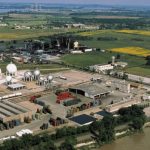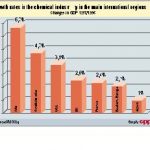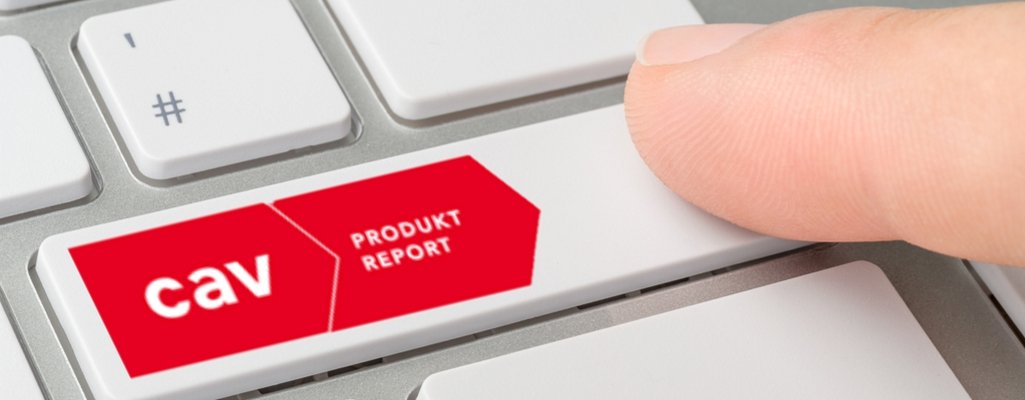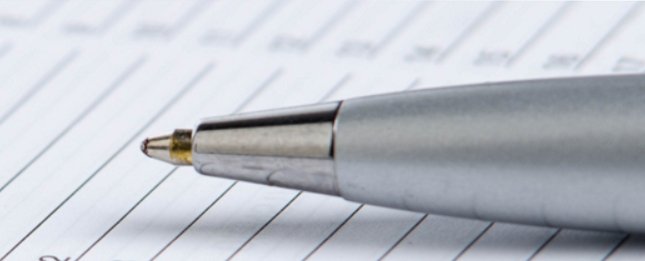The chemical industry is already one of the leading branches of industry in the Aquitaine region today, but its future development will depend primarily on the arrival of foreign companies. The Bordeaux Region Development Agency was set up to help new investors with their projects.
With a population of 800 000, the Bordeaux Urban District ranks among the largest metropolitan areas in France. It is located in the Aquitaine region which has a population of 2.8 million. Agriculture, and more particularly wine-growing, are not the only assets of Bordeaux and its ‚département‘, the Gironde. The regional economy also includes actors in defence and aerospace, the automotive industry, electrical engineering and electronics, wood and paper, as well as chemistry and pharmacy. The Aquitaine region is home to more than 16 000 industrial firms which employ over 25% of its population.
In the first half of the 90s, the economic situation deteriorated dramatically, leading to a steep rise in unemployment. This was caused by a sharp drop in turnover, particularly in the armaments industry, but also by industrial relocation and far-reaching streamlining measures in various sectors. The region started looking for new investors likely to create lasting employment.
Against this backdrop, the City of Bordeaux, in partnership with the Chamber of Industry and Commerce as well as with various municipal and regional associations, set up the B.R.A., the Bordeaux Region Development Agency, in 1996. Today, other economic and political partners as well as over 50 companies from the region also support the B.R.A..
The B.R.A.: a helping hand for new companies
The aim of the B.R.A. is to promote Bordeaux and the Gironde on the international scene as an industrial location, to attract new investors and to provide assistance with investment projects on the spot. Wilfred Muskens, European Project Manager at the B.R.A., comments : „With the B.R.A., foreign investors now have an interlocutor who gives advice on legal matters and provides assistance in finding suitable sites or in preparing financing plans. We also help companies find qualified staff, contract manufacturers and partners for joint ventures. This assistance is provided at no cost to investors.“ The B.R.A. generally accompanies new firms over a time period spanning one to two years.
Basic financial conditions and constraints for projects are the key issue for investors. Wilfred Muskens explains that the city and the region offer direct financial aid, the level of which depends on the investment volume, the sector and the number of new jobs created. These subsidies can be used for premises, machines or plant, as well as for re-search and training. Furthermore, companies can be exempted from local business tax for a period of up to six years. The current priority is the development of the chemical industry. Wilfred Muskens emphasises that in-vestors in the chemical sector and builders of plant and process equipment linked to such investments can expect to benefit from the maximum financial and logistic assistance. In this context, the B.R.A. is also seeking to strengthen its contact with German firms.
Bordeaux and its region have the following advantages specifically relevant to the location of pharmaceutical and chemical companies:
• Viable sites, even for installations with problematic operating conditions,
• water and energy supplies at extremely competitive prices on a European level,
• short official construction and operating permit procedures,
• excellent transport and logistics infrastructure, thanks to the international airport, as well as good links to the extensive SNCF network, the port and the motorway network,
• public universities and research institutes which not only train qualified staff, but which also have substantial experience in cooperation with industry,
• good local market potential thanks to companies already present in the region.
The region’s industrial climate is another important aspect for investors. Wilfred Muskens specifies: „Investors in this region will find an extremely well-qualified work force. We have very few cases of labour unrest here. The Bordeaux Port Authority, for example, has had only a single day of strikes in its 25-year history. The same goes for many other companies. The balanced social climate is determined by the excellent quality of life in our region.“
Aquitaine – a chemical site
According to estimates by INSEE, the French statistical institute, Aquitaine has 210 chemical firms, representing approximately 7.5% of regional industrial jobs. This makes a staff of 13,500 in total, including about 500 research scientists and 300 students. The contribution of the chemical industry towards the industrial wealth of the region is 7.3%, corresponding to approximately 4,500 million Francs. A large proportion of the manufactured products are exported.
The chemical companies present in the region include Cofrablack and Eka Chimie. These two companies maintain close contact with the B.R.A. and support its activities.
Cofrablack, one of Europe’s leading carbon black producers, was founded in 1959 by the American Philips Petroleum Company and Continental Carbon Company. The first three production lines started up in Ambès as early as 1960, while the fourth line began production in 1970. The raw materials for carbon black production are heavy petroleum from steam crackers and natural gas. In the first half of the 80s, the massive increase in the price of oil led to a sharp drop in turnover, making it necessary to shut down one of the production lines in 1984. In 1986, Degussa bought 100% of the Philips Petroleum Company’s shares. Since the market situation recovered substantially over the next few years, the fourth production line was able to start up again in 1990. Today, Cofrablack manufactures 82 000 tons of carbon black a year. The company has a staff of 125 and achieves a turnover of 49.3 million US dollars. When asked why the company has been operational in the Bordeaux region for the last 40 years, Claude Perchicot, Managing Director of Cofrablack, replies: „Despite the higher price of raw materials due to more expensive transport, our cost structure here is basically positive. On the one hand electricity and natural gas are extremely cheap in France, and on the other hand salaries are slightly lower here than in Germany, for example. Furthermore, our geographical location is a good access point for the French and Spanish markets“. The proximity to the Ambès port facilities and the excellent road and rail links were also significant advantages for Eka Chimie SA, a subsidiary of Akzo Nobel. Since 1992, the company has been producing various chemicals for bleaching paper in Savoie and Gironde. The two production sites have a combined staff of 103. At Ambès, Eka Chimie operates two electrolytic plants for manufacturing sodium chlorate used to bleach paper. The plants run around the clock and have a capacity of about 60 000 tons a year. Over 60% of the potassium chlorate manufactured there is sold on the French and Spanish markets.
The Bordeaux Freight Port
The Bordeaux Freight Port has a total of six port facilities, spread over sixty miles along the banks of the Gironde and Garonne rivers. The oldest facility is in Bordeaux itself, though it is no longer used very much. On the other hand, the port facilities in Bassens, Ambès, Blaye, Pauillac and Le Verdon on the estuary opening to the Atlantic have significant economic impact. The Bassens and Ambès facilities are particularly active for the transhipment of chemicals. About 1600 ships on average berth at the 35 loading wharves of the Bordeaux Freight Port each year. Ships can have a draught from 10 to 12.5 meters. Each year, between 8.5 and 9 million tons of freight are transhipped by a staff of 500. Approximately half are oil or oil products. In 1997, the turnover was 250 million Francs. „The Bordeaux Port“, explains Philippe Prat, spokesman for the Bordeaux Port Authority „is a medium-sized port with enormous potential for development. We have 4000 hectares available for new companies in the Port area.“
SNCF specialised in transports of dangerous goods
In addition to the sea route, companies can make use of the efficient and extensive network of SNCF, the French railway company, to deliver and ship chemicals. 30% of all oil, chemical and metal transports take place by rail. The oil, chemical and metal sector transports 20 million tons of freight across France and Europe, of which 80% are dangerous goods.
Patrick Mayen, Director of the Bordeaux branch, explains the services offered by the French railway company: „SNCF has an international distribution network which was recently extended to cover Eastern Europe. For example, we transport mineral acids, caustic soda, chlorine, alcohol and hydrocarbons. Depending on the quantities to be carried, we can offer our clients full trains with a capacity of 1000 to 2400 tons, half-trains for 500 tons and more or individual wagons. Each wagon can hold over 25 tons of freight. Full trains and half-trains travel to the consignee by the most direct route. Wagons arrive at their destination in a very short time thanks to the optimised logistics system we use for our trains.“
Furthermore, the railway company endeavours to provide a rail link to new companies immediately. Extremely favourable financial terms are offered to companies for this purpose, with special loans at low interest rates as well as discounts depending on tonnage.
Leading universities and research institutes
Another significant advantage for the chemical industry is the proximity to research institutes, for instance the University of Bordeaux I, the Ecole Nationale Supérieure de Chimie et de Physique de Bordeaux (ENSCPB – Higher National College of Chemistry and Physics), the Paul Pascal Research Centre and the Institute of Solids Chemistry. The latter two belong to CNRS, the national research centre. The institutes cooperate closely with industry on practical research projects. They also maintain many international contacts and train highly qualified, specialist staff. About 15% to 20% of all students who successfully complete their studies at the University of Bordeaux come from the chemistry department.
The Institut Européen de Chimie et de Biologie (IECB – European Institute of Chemistry and Biology) at the Ecole Polytechnique focuses on research work geared towards future needs. „The Institute was founded in 1997“, explains Director Joseph Wagner, „to perform research on scientific phenomena on the borderline between chemistry and biology. Our assignments range from the computer-assisted development of new molecules to cellular biology and biophysics of organised biological systems, via organic synthesis.“
The organisational structure of the IECB is rather unusual: the Institute is headed by an international scientific council. Over 50% of all scientists, doctoral candidates and post-doctoral scientists hail from abroad. Furthermore, the Institute has no tenure system. All scientists have contracts for a specific time period only. Joseph Wagner comments: „This structure guarantees flexibility and motivation. It also emphasises the international character of modern research.“ (le)
Bordeaux Region Development Agency
Fax: ++33/5/56795133
Further information cpp-200
The chemical industry in France
The chemical industry in France is ranked fourth in the world behind the United States, Japan and Germany.
According to data provided by CRICCAq, the local employers federation, the French chemical industry experienced a 2.4% growth rate from 1996 to 1997. The figure for the European Union is 2.6%. Over the same period, Asia had the highest growth rate with 6.7%, followed by South America with 4.7% and the United States with 3.6%. CRICCAq forecasts a growth rate of about 3.5% for the French chemical industry in 1998.
The development of product quantities is also positive. In 1997, France did better than both
the European Union and the United States, with a growth rate of 5.2%. Even taking into account national figures, the trend remains positive. Whereas production volumes in all branches other than chemistry either fell or stagnated between 1990 and 1997, the French chemical industry increased its global production quantities by almost 30% over the same period. There has also been marked progress in exports. In 1995, they reached a value of 203,700 million Francs. In 1997, exports were worth 239,400 million Francs. French chemicals are purchased mainly in the European Union, the United States, Eastern Europe and Asia.
Unsere Webinar-Empfehlung
Die Websession „Wasserstoff in der Chemie – Anlagen, Komponenten, Dienstleistungen“ (hier als Webcast abrufbar) zeigt technische Lösungen auf, die die Herstellung und Handhabung von Wasserstoff in der chemischen Industrie sicher machen und wirtschaftlich gestalten.
Ob effizienter…
Teilen:













